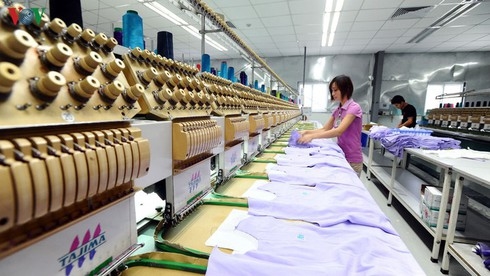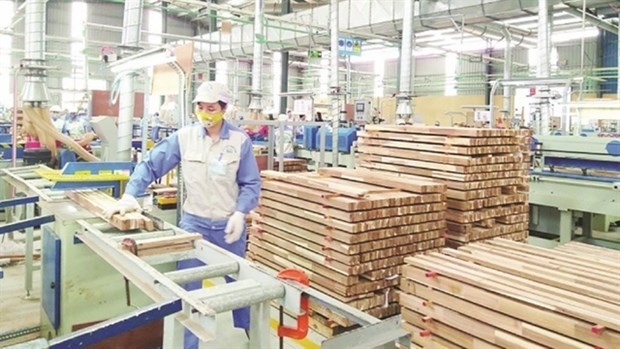Businesses forced to adapt during COVID-19 crisis
Friday, April 3,2020
AsemconnectVietnam - With the initial outbreak of the novel coronavirus (COVID-19) occurring over two months ago, the scale of the virus has begun to take a heavy toll on many Vietnamese firms, prompting them to either scale back production and lay off staff or face bankruptcy.
Preliminary statistics released by the Ministry of Labour, Invalids and Social Affairs indicate that roughly 9,000 workers throughout 22 provinces and cities have been laid off as a result of their businesses cutting or suspending production due to the impact of the COVID-19.
In an attempt to weather the storm and cope with the fallout from the epidemic, many enterprises have been forced to adapt themselves to the crisis by putting forward alternative business and market research strategies in order to maintain production and make preparations for the post-crisis period.
With shortages occurring in terms of materials and orders, garment companies have agreed to share existing orders and material reserves so they can retain production during March and April, while simultaneously seeking alternative sources of materials.
Several popular garment makers such as Garment No10, Viet Tien, Hoa Tho, Nha Be, and Phong Phu have begun to produce anti-bacteria face masks which have been in short supply in recent weeks.
Elsewhere, firms that supply essential goods necessary for daily consumption have also moved to introduce new strategies in an attempt to adapt to the new business climate.
Indeed, Masan, the group that owns the VinMart and VinMart+ supermarket chains, believes that alongside ensuring supply sources of quality products remain in place, all of its retail stores have offered online or phone services, making it convenient for consumers to place orders and then subsequently have their items delivered.
With the scale of the COIVD-19 being vast, economic experts agree that the crisis can be considered as a test of the economy's ability to withstand external shocks, forcing it to become more competitive, improve its overall production capacity, and develop consumption within its own domestic market.
According to Mac Quoc Anh, Vice President and General Secretary of the Association of Small and Medium-sized Enterprises, this marks the time for experienced enterprises to restructure their organisation and production chains so they can get ahead and enjoy more efficient business strategies in the context of Industry 4.0.
In contrast, many small firms will lose out oe even go bankrupt if they fail to seize their opportunities such as their state subsidy, Anh says.
Sharing this view, economist Nguyen Minh Phong believes the crisis will test each businesses’ ability to respond to market fluctuations and introduce new, efficient business solutions.
The crisis will also give enterprises a lesson in how to connect with employees. If firms are able to guarantee both the short- and long-term interests of their employees, then they will be able to retain their workforce and thus maintain post-crisis business efficiency, says Phong.
Source: Vov.vn
Masan successfully disbursed Phase 1 of USD650 million syndicated loan
Viettel Global (VGI)'s consolidated revenue exceeded USD1 billion, pre-tax profit over VND3,000 billion in 2022
Gelex (GEX) sets a profit target of nearly VND1,300 billion in 2023
VIX Securities (VIX) expected to increase profit after tax by 73.1% to VND540 billion in 2023
VietinBank Securities (CTS) sets a profit target of more than VND230 billion in 2023, paying 10% dividend
Thai Nguyen International Hospital (TNH) sets a profit after tax plan of VND150 billion in 2023
Lienvietpostbank's own path for 15 years
PVMachino (PVM) divested from Nippon Seiki for over VND149 billion
SSI Research revised down forecast PV Gas’s revenue and net profit in 2023
Petrosetco's profit (PET) decreased by 50% to VND35 billion in the first 2 months of 2023
GC Food (GCF) target VND523 billion revenue in 2023
Mobile World (MWG): Revenue of Mobile World and Dien May Xanh chains down 32% in the first 2 months of 2023
SHS Securities reported a profit of VND197.2 billion in 2022 after the audit
IDI Multinational Development and Investment (IDI): Profit expected down 66.7% to VND186 billion in 2023

Plan on implementing Decision No. 327/QD-TTG dated March ...
Concretize viewpoints, objectives, tasks and solutions of the plan in accordance with practical conditions of the locality, associating ...Plan on implementing national environmental protection ...
Implementation plan of marine aquaculture development ...
Program on conservation and development of Vietnamese ...
Plan on improving quality of human resources to 2025 and ...

Efforts taken to turn culinary culture into national ...
The Vietnam Cuisine Culture Association (VCCA) is taking steps to implement a project to build and develop Vietnamese culinary culture ...Vietnamese cuisine making a name for itself with ...
Vietnam advance to next round of AFC U20 Women’s Asian Cup
Cultural tourism and traditional values promoted through ...



